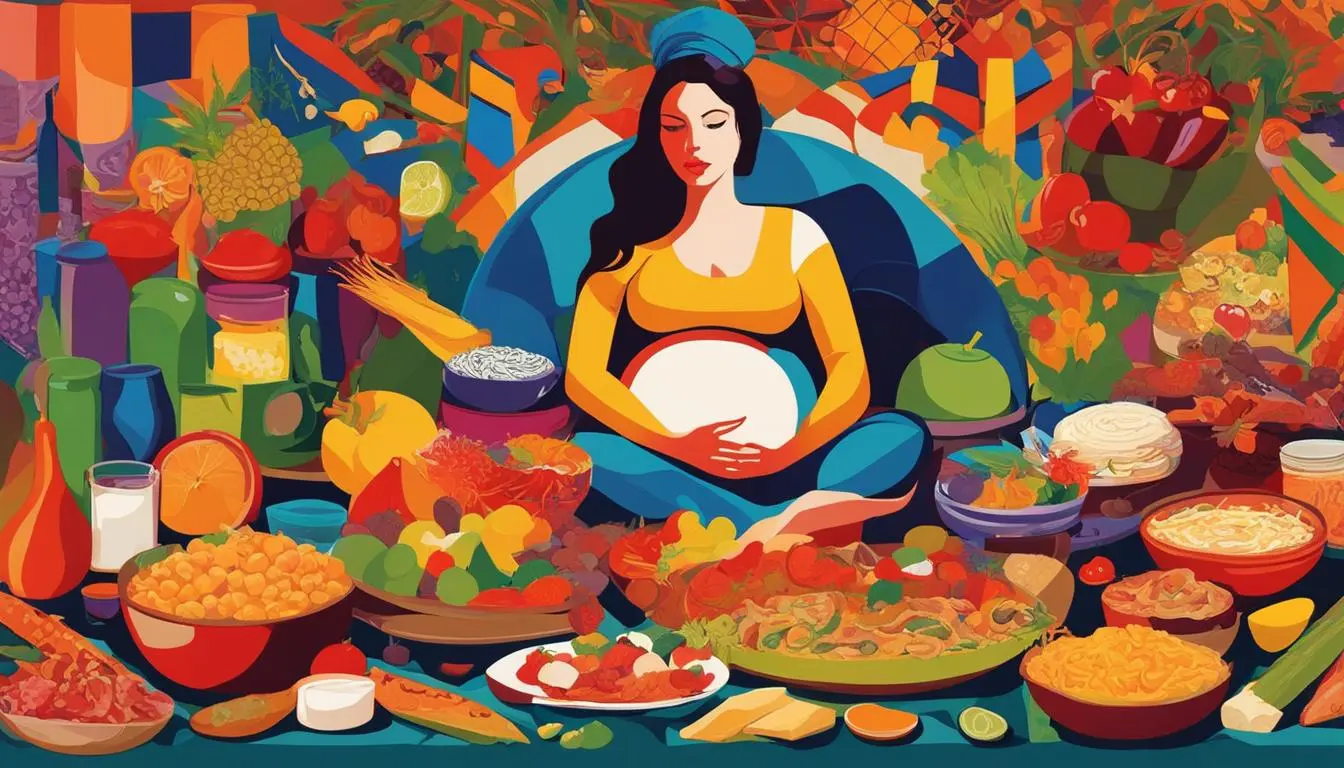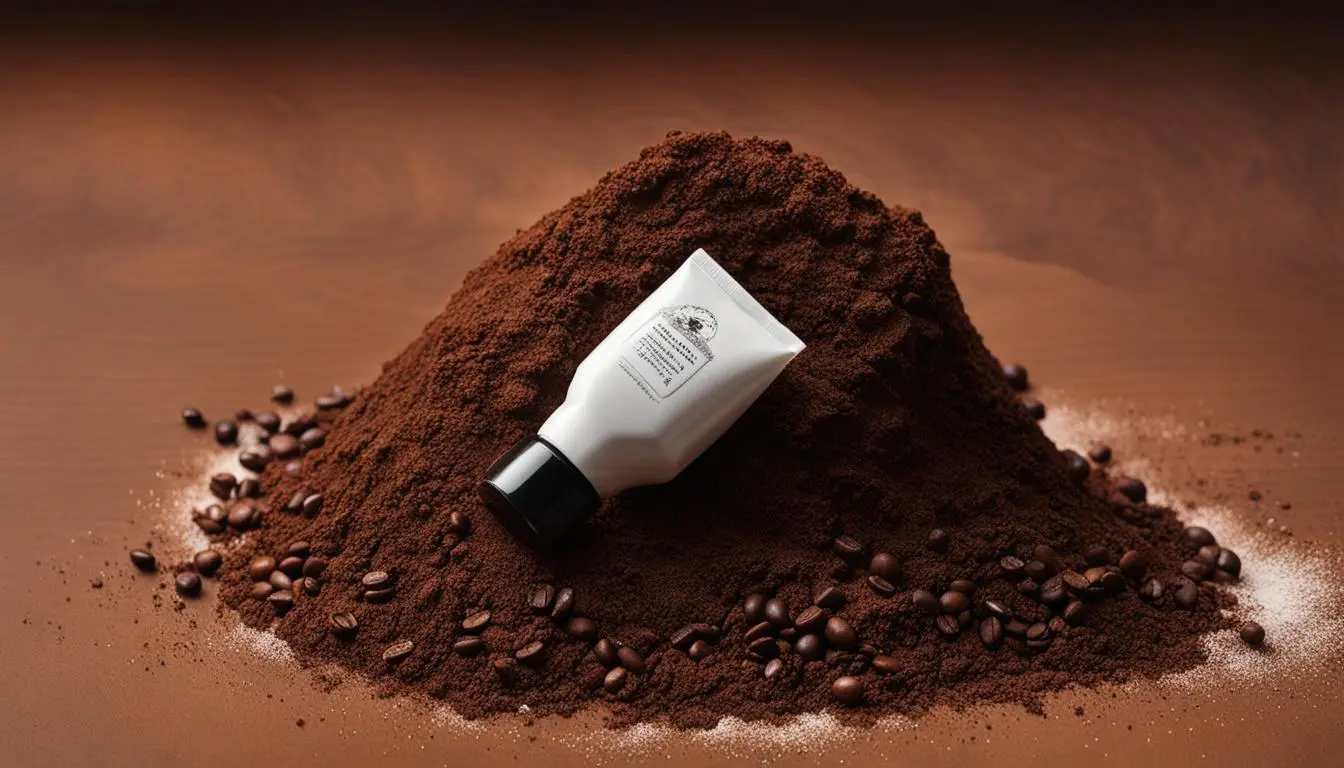Pregnancy cravings can be quite diverse and unusual, with women experiencing cravings for a wide range of foods and even non-food items during pregnancy. These cravings are not just limited to common foods like red meat or spicy food, but can extend to more unique and unexpected cravings like ice, coal, rubber, soil, toothpaste, and even cigarette ashes. These cravings may be influenced by factors such as hormonal changes, cultural and familial preferences, and emotional comfort. Cravings can vary widely among different women and can start as early as the first trimester, often peaking during the second trimester. Now let’s explore the unique pregnancy cravings around the world.

Key Takeaways:
- Pregnancy cravings can be diverse and unique, extending beyond common foods.
- Cravings can include non-food items like ice, coal, rubber, soil, toothpaste, and cigarette ashes.
- Factors such as hormonal changes, cultural preferences, and emotional comfort can influence cravings.
- Cravings can vary widely among different women and can start as early as the first trimester.
- It’s important to listen to the body, indulge cravings in moderation, and maintain a balanced diet during pregnancy.
Related: The Benefits of Fennel Seeds During Pregnancy
Unique Pregnancy Cravings Around the World
Unusual Cravings During Pregnancy: Ice, Coal, and Rubber
While pregnancy cravings are commonly associated with specific foods, some women experience more unusual cravings during this time. These unique cravings can range from non-food items to unexpected flavors and textures. Let’s explore three of the most surprising cravings reported by pregnant women: ice, coal, and rubber.
Ice Cravings During Pregnancy
One of the more peculiar cravings experienced by pregnant women is a strong desire to chew ice cubes. This phenomenon, known as pagophagia, is often linked to iron deficiency anemia. While the exact reason behind this craving is still unclear, some researchers suggest that chewing ice may provide temporary relief for oral discomfort or inflammation caused by hormonal changes during pregnancy.
Cravings for Coal
Craving coal, a non-food item, is another unusual desire reported by some pregnant women. The taste, smell, or texture of coal may become strangely appealing during this time. This craving, known as pica, may be related to a deficiency in essential minerals or other nutritional imbalances. It is essential for women experiencing cravings for non-food items like coal to consult with their healthcare provider to ensure proper nutritional intake and address any underlying concerns.
Chewing on Rubber
Surprisingly, pregnant women have also reported cravings for rubber items such as rubber bands or hot water bottles. This unusual desire to chew on rubber may stem from the hormonal changes and heightened sensory experiences during pregnancy. However, it is important to note that chewing on rubber can pose a choking hazard or lead to unwanted health risks, and therefore, it is crucial to find safer alternatives to satisfy cravings.
In summary, pregnancy cravings can extend beyond the realm of food and encompass a wide range of unusual desires. Cravings for ice, coal, and rubber are just a few examples of the unique experiences that pregnant women may encounter. It’s important to address these cravings with caution, ensuring that they are satisfied in a safe and healthy manner. Consulting with a healthcare provider can provide guidance on managing unusual cravings and maintaining a balanced diet during pregnancy.
Related: Can You Eat Chicken Salad While Pregnant?
Soil, Toothpaste, and Laundry Detergent: Extraordinary Cravings Worldwide
Pregnancy cravings can take on extraordinary forms, with some women around the world reporting cravings for non-food items. These cravings highlight the unique experiences and diversity of pregnancy cravings.
Britney Spears, known for her unique taste, famously craved soil during her pregnancy, showcasing the extent to which cravings can vary among women. While the reasons behind these cravings are not fully understood, some suggest that cravings for non-food items may be influenced by nutrient deficiencies or hormonal changes.
Another intriguing craving reported by pregnant women is toothpaste. While most people associate toothpaste with oral hygiene, some pregnant women can’t resist its minty freshness and often find themselves indulging in a small taste. Similarly, the smell of laundry detergent can be incredibly appealing to certain pregnant women, like Martine McCutcheon. These unconventional cravings demonstrate the fascinating and sometimes unexpected desires that accompany pregnancy.
| Non-Food Craving | Notable Individual | Reasons |
|---|---|---|
| Soil | Britney Spears | Unknown, possibly nutrient deficiencies or hormonal changes |
| Toothpaste | Various pregnant women | The minty freshness is appealing, but reasons vary |
| Laundry detergent | Martine McCutcheon and others | The smell is comforting and appealing |
It’s important to recognize that while these cravings may seem unusual, they are relatively harmless when indulged in moderation. However, it’s crucial for pregnant women to prioritize a balanced and nutritious diet while satisfying their unique cravings. Additionally, if a pregnant woman experiences cravings for non-food items, it is essential to consult with a healthcare professional to ensure no underlying health issues are present.
Related: Can You Safely Eat Takis While Pregnant?
Unconventional Cravings During Pregnancy: Raw Onion, Paint, and Matches
While pregnancy cravings are often associated with common food items, some women experience unusual and unconventional cravings that may raise eyebrows. From raw onion to paint and matches, these cravings showcase the unique experiences women have during pregnancy.
One surprising craving reported by pregnant women is raw onion. Despite its pungent odor and ability to bring tears to the eyes, some women find themselves irresistibly drawn to the taste and texture of this humble vegetable.
Another unconventional craving is paint. Whether it’s the fumes or the act of licking painted walls, some pregnant women develop a desire for the smell and taste of paint. It’s important to note that indulging in this craving can pose potential risks to the health of both the mother and the baby, as exposure to toxic chemicals in paint can be harmful.
Matches, known for their characteristic rotten egg smell, have also been craved by pregnant women. The allure of the sulfuric aroma of matches can be particularly strong for some expectant mothers. However, it’s essential to prioritize safety and avoid indulging in this type of craving, as ingesting matches can lead to serious health consequences.

Unconventional Cravings during Pregnancy
| Craving | Description |
|---|---|
| Raw Onion | Pregnant women develop a craving for the taste and texture of raw onion, despite its strong odor and ability to make eyes water. |
| Paint | Some women experience a craving for the smell or taste of paint, which can be potentially harmful due to exposure to toxic chemicals. |
| Matches | Matches, known for their rotten egg smell, have been craved by pregnant women, despite the health risks associated with ingesting them. |
Related: Can You Safely Eat Feta Cheese While Pregnant?
Petrol, Toilet Paper, and Sawdust: Bizarre Cravings Worldwide
Pregnancy cravings can take on some truly bizarre forms, with women around the world reporting cravings for unusual and unexpected items. These cravings may seem strange to some, but they highlight the diverse experiences that women have during pregnancy. One example of a bizarre craving is a desire for the smell of petrol. Some women report that the aroma of petrol is strangely appealing during pregnancy, although it is important to note that inhaling or consuming petrol can be extremely dangerous and should be avoided.
Another unusual craving that some pregnant women experience is a desire for the taste and texture of toilet paper. While this may seem puzzling, cravings for non-food items like toilet paper can be a symptom of a condition called pica. Pica is characterized by an appetite for substances that have no nutritional value, and it is important for women experiencing these cravings to discuss them with their healthcare provider.
One more bizarre craving that has been reported is a craving for the aroma and taste of sawdust. While it may be tempting to indulge in these cravings, it is important to prioritize the health and safety of both the mother and the baby. Consuming non-food items like sawdust can be harmful and should be avoided.
Table: Bizarre Pregnancy Cravings
| Craving | Description |
|---|---|
| Petrol | Some women crave the smell of petrol during pregnancy, although it is important to avoid inhaling or consuming petrol due to its harmful effects. |
| Toilet Paper | Cravings for toilet paper can be a symptom of a condition called pica, which should be discussed with a healthcare provider. |
| Sawdust | While craving the aroma and taste of sawdust may seem unusual, it is important to avoid consuming non-food items for the safety of both the mother and the baby. |
These bizarre cravings during pregnancy serve as a reminder of the unique and sometimes surprising experiences that women go through. It is essential for pregnant women to prioritize their health and wellness, making informed decisions about what they consume and seeking guidance from their healthcare providers when experiencing unusual cravings.
Related: Can You Eat Cotija Cheese While Pregnant?
Talcum Powder and Coffee Grounds: Surprising Cravings
While pregnancy cravings are often associated with food items, some women experience cravings that are truly surprising and unexpected. Two notable examples are talcum powder and coffee grounds.
For some pregnant women, the smell and taste of talcum powder can be irresistible. This unusual craving may be due to the combination of hormonal changes and sensory sensitivity during pregnancy. Although it may seem strange, it’s important to note that indulging in this craving should be done in moderation, as excessive consumption of talcum powder can have adverse health effects.
Coffee is a common craving among many people, but during pregnancy, some women specifically crave the smell and taste of coffee grounds. This craving may be related to the rich aroma and comforting properties of coffee. However, it’s important to be mindful of caffeine intake during pregnancy. Limiting caffeine consumption is recommended to ensure the well-being of both the mother and the baby.

Surprising Pregnancy Cravings
Throughout pregnancy, women experience a wide range of cravings that can vary in intensity and uniqueness. While talcum powder and coffee grounds cravings may seem out of the ordinary, they highlight the diverse and sometimes puzzling nature of pregnancy cravings. It’s essential for pregnant women to listen to their bodies, indulge in cravings within moderation, and prioritize a balanced and nutritious diet for optimal health.
Related: Is it safe to eat mayonnaise during pregnancy?
Understanding Pregnancy Cravings: Causes and Myths
One of the most intriguing aspects of pregnancy is the phenomenon of cravings. While the exact cause of pregnancy cravings remains a mystery, they are believed to be influenced by hormonal changes during pregnancy. These hormonal fluctuations can impact a woman’s sense of taste and smell, leading to specific cravings for certain foods or aversions to others. The cravings experienced by pregnant women can vary widely, from common and expected to unusual and even bizarre.
There are many myths surrounding pregnancy cravings, and it’s important to separate fact from fiction. Contrary to popular belief, cravings are not necessarily a sign of nutritional deficiencies. They are more likely to be influenced by cultural and familial preferences, emotional factors, and the body’s increased energy and nutrient needs during pregnancy. While giving in to cravings in moderation is generally fine, it is important to maintain a balanced and nutritious diet for the health of both the mother and the baby.
It’s worth mentioning that some women may experience cravings for non-food items, a condition known as pica. Cravings for non-food items like soil, toothpaste, or laundry detergent should be discussed with a doctor, as they may indicate underlying health issues that need to be addressed.
| Myth | Fact |
|---|---|
| Cravings indicate nutritional deficiencies. | Cravings are influenced by various factors and are not necessarily linked to nutritional deficiencies. |
| Indulging in cravings is harmful. | Indulging in cravings in moderation is generally fine, as long as a balanced and nutritious diet is maintained. |
| Cravings for non-food items are harmless. | Cravings for non-food items like soil or toothpaste should be discussed with a doctor, as they may indicate underlying health issues. |
Overall, understanding and managing pregnancy cravings can be both a fascinating and challenging aspect of the journey towards motherhood. By listening to their bodies, pregnant women can embrace their cravings while prioritizing a well-rounded diet that supports the health of both themselves and their baby.
Cultural Influences on Pregnancy Cravings
Pregnancy cravings are not only influenced by hormonal changes and physiological factors but also by cultural beliefs and traditions. Different cultures around the world have their own unique set of traditional cravings that pregnant women experience during their journey to motherhood. Understanding and embracing these cultural influences can provide insight into the diverse range of pregnancy cravings and add a sense of joy and connection to the experience.
In many Asian cultures, such as India and China, pregnant women often crave foods that are considered auspicious or have symbolic meanings. For example, in India, cravings for pickles, sweets, spicy food, dairy dishes, and fruits are common. These foods are believed to bring good luck, promote fertility, or provide essential nutrients for the baby. Similarly, in Chinese culture, certain foods like ginger, vinegar, and fish are believed to have beneficial effects on the mother and baby’s health.
In African cultures, there are also specific traditional cravings that hold cultural significance. For instance, in Nigeria, pregnant women may crave foods like okra soup, melon seeds, or palm wine, which are considered traditional delicacies. These cravings are often associated with cultural celebrations, family rituals, and the desire to maintain a connection to one’s heritage.
The Impact of Cultural Cravings
The cultural context of pregnancy cravings goes beyond just the food itself. It creates a sense of belonging and identity for pregnant women, allowing them to connect with their cultural heritage and traditions. These cravings can also serve as a way for families and communities to come together and celebrate the joyous occasion of pregnancy.
Furthermore, cultural cravings during pregnancy may have physiological and psychological benefits. Consuming familiar foods that are part of one’s cultural identity can provide comfort and emotional well-being, especially during a time of physical and hormonal changes. It can also promote a balanced and nutritious diet by incorporating traditional dishes that are often rich in essential nutrients.
Embracing Cultural Cravings
It is important for pregnant women to embrace and indulge in their cultural cravings, as long as they are safe and within moderation. This allows the mother to experience the joys and traditions of her culture, while also providing nourishment for herself and her baby. However, it is essential to maintain a balanced diet and consult with healthcare professionals to ensure that the cravings are compatible with any dietary restrictions or health concerns.
In conclusion, pregnancy cravings are not solely influenced by physiological factors but also by cultural beliefs and traditions. Embracing and understanding the cultural context of cravings can add depth and richness to the pregnancy experience. By indulging in traditional cravings, pregnant women can connect with their cultural heritage, find comfort and emotional well-being, and maintain a balanced and nutritious diet. So go ahead and savor those cultural cravings with pride!
Related: Can You Eat Anchovy During Pregnancy?
Conclusion
Pregnancy cravings are a fascinating and often amusing part of the journey towards motherhood. Women worldwide experience a wide range of cravings during pregnancy, from the common to the bizarre. These cravings can be influenced by hormonal changes, cultural and familial preferences, emotional factors, and nutrient needs.
While the exact cause of cravings remains a mystery, understanding and managing cravings can be a joyful and satisfying part of the pregnancy journey. It’s important for women to listen to their bodies, indulge in cravings within moderation, and maintain a balanced and nutritious diet for the health of both themselves and their baby.
So whether you find yourself craving ice, coal, raw onion, or even toilet paper, know that you are not alone. Pregnancy cravings are unique to each woman and reflect the diversity of experiences during this special time. Embrace your cravings, explore new flavors, and enjoy the journey as you nourish both your body and the new life growing within you.
Related: Olives During Pregnancy | (10 Benefits & 5 Side Effects)
Frequently Asked Questions (FAQs)
Are pregnancy cravings limited to food items?
No, pregnancy cravings can extend to non-food items as well, such as soil, toothpaste, and laundry detergent.
Why do pregnant women experience cravings for non-food items?
The exact cause of these cravings is not known, but factors such as hormonal changes and emotional comfort may play a role.
Should I be concerned if I have cravings for non-food items?
Cravings for non-food items, known as pica, should be discussed with a doctor as they may indicate underlying health issues.
Can giving in to cravings during pregnancy be harmful?
Giving in to cravings in moderation is generally fine, but it’s important to maintain a balanced and nutritious diet for the health of both the mother and the baby.
What causes pregnancy cravings?
Hormonal changes during pregnancy can affect taste and smell, leading to specific cravings or aversions. Emotional factors, cultural influences, and nutrient deficiencies can also contribute to cravings.
Are cravings a sign of nutritional deficiencies?
Cravings are not necessarily a sign of nutritional deficiencies. They are more likely influenced by hormonal changes and other factors.
Why do different cultures have different pregnancy cravings?
Pregnancy cravings can be influenced by cultural beliefs, traditions, and the significance of certain foods in a particular culture.
Should I indulge in cravings during pregnancy?
It’s important to listen to your body and indulge in cravings within moderation. Maintaining a balanced and nutritious diet is key.
What is the significance of understanding the cultural context of cravings?
Understanding the cultural context of cravings can help pregnant women and their families navigate this unique aspect of pregnancy and find joy in indulging in their favorite traditional foods.
Source Links
- https://www.emmasdiary.co.uk/blog/the-20-weirdest-pregnancy-cravings-ive
- https://www.salemnews.com/news/curious-cravings-the-strangest-and-most-common-pregnancy-food-combos/article_9b3dbd12-5189-11ee-a6f5-7788ac774f35.html
- https://lifecarekarnal.com/most-common-food-cravings-during-pregnancy/












